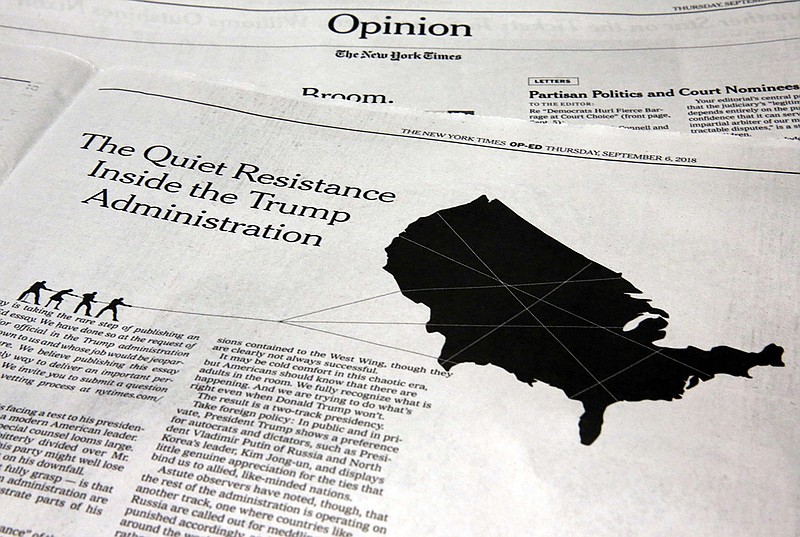More and more, I wonder if the disgruntled senior Trump administration official who wrote the anonymous op-ed in The New York Times was actually representing a group - like a "Murder on the Orient Express" plotline where every senior Trump adviser was in on it.
Why? Because the article so perfectly captured the devil's bargain they've all struck with this president: Donald Trump is an amoral, dishonest and disturbed person, a man totally unfit to be president, but, as the anonymous author self-servingly wrote: "There are bright spots that the near-ceaseless negative coverage of the administration fails to capture: effective deregulation, historic tax reform, a more robust military and more."
That's the anonymous-Republican credo today: We know Trump is a jerk, but you've gotta love the good stuff - you've got to admit that his tax cuts, deregulation, destruction of Obamacare and military buildup have fueled so much growth, defense spending and record stock market highs that we're wealthier and more secure as a country, even if Trump is nuts. So our consciences are clear.
This view is not without foundation. Economic growth and employment have clearly been on a tear since Trump took office. I'm glad about that.
But what if Trump is actually heating up our economy by burning all the furniture in the house? It's going to be nice and toasty for us - at least for a while - but where will our kids sleep?
What if Trump's tax cuts, deregulation, scrapping of Obamacare without any alternative and military spending surge were actually ill-thought-through, short-term-focused initiatives that all ignored expert opinion and collectively amount to a sugar high that not only will be unsustainable but will leave our economy far more vulnerable in the long term?
Let's take thatview for a spin: I favor corporate tax cuts - big ones. But I would have offset them with a carbon tax, a tax on sugar and a small financial transaction tax. That way, we'd unleash the energy of our corporations while mitigating climate change, spurring the next great global industry - clean power - curbing childhood asthma and diabetes and not adding to our national debt, thereby making ourselves more resilient as a country.
When Trump simultaneously cuts corporate taxes and withdraws America from the Paris climate accord, tries to revive the coal industry by lowering pollution standards and weakens fuel economy standards for U.S.-made cars and trucks, he is vastly adding to the financial debts and carbon debts that will burden our children.
And he is doing this despite many economists warning that increasing the deficit when your economy is already growing nicely is really, really reckless - because you may need that money to stimulate your way out of the next recession.
In June, The Associated Press reported on the latest International Monetary Fund survey of the U.S. economy, which concluded that as a result of Trump's "tax cuts and expected increases in defense and domestic programs, the federal budget deficit as a percentage of the total economy will exceed 4.5 percent of GDP by next year - nearly double what it was just three years ago." Such a "big boost has not been seen in the United States since President Lyndon Johnson in the late 1960s boosted spending on the Vietnam War at the same time it was adopting Johnson's Great Society programs."
Faced with so much debt, which the country will not be able to grow out of, The AP story continued, paraphrasing the IMF report, the U.S. "may need to take politically painful steps," such as cutting Social Security benefits and imposing higher taxes on consumers. (We'll probably also have to limit spending on new roads, bridges and research.)
You might want to let your kids know that.
The New York Times
